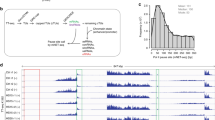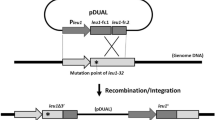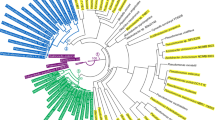Abstract
THE availability of well characterised conditional lethal mutants will widen our knowledge of the genetics and physiology of mammalian cells. Temperature-sensitive mutants (ts mutants) have been very useful in studies carried out in a great variety of systems from microorganisms to Drosophila. We have undertaken the characterisation of a ts mutant (K12) isolated by Roscoe et al.1 from the established line of Chinese hamster fibroblasts WglA. The K12 mutant has two interesting properties: it is a cell-cycle mutant2,3, having its execution step (the time during which the mutated function is required by the cells in order to progress through the cell cycle) during the 4 h preceding the initiation of the S phase; and the synthesis of three specific cellular polypeptides is enhanced when the cells are incubated at the non-permissive temperature (40.5 °C) (J.A.M. and V. Fincham, unpublished). These polypeptides, called A, B and C, are not affected in other ts mutants defective for the initiation of the S phase and in hybrids in which the K12 mutation is complemented. These data suggest that the K12 mutant is affected in some function necessary both for the commitment of the cells to new rounds of DNA replication and for the regulation of A, B and C polypeptide synthesis. We now present evidence, obtained by investigating the effect of actinomycin D on the proteins synthesised by K12 cells, incubated at the non-permissive temperature and by synthesising the proteins in vitro, that the synthesis of these proteins is regulated at the transcriptional level.
This is a preview of subscription content, access via your institution
Access options
Subscribe to this journal
Receive 51 print issues and online access
$199.00 per year
only $3.90 per issue
Buy this article
- Purchase on Springer Link
- Instant access to full article PDF
Prices may be subject to local taxes which are calculated during checkout
Similar content being viewed by others
References
Roscoe, D. H., Read, M. & Robinson, H. J. cell. Physiol 82, 325 (1973).
Roscoe, D. H., Robinson, H. & Carbonell, A. W. J. cell. Physiol. 82, 333 (1973).
Smith, B. J. & Wigglesworth, N. W. J. cell. Physiol. 82, 339 (1973).
Dulbecco, R. & Freeman, G. Virology 8, 396 (1959).
Laemmli, U. K. Nature 227, 680 (1970).
Laskey, R. A. & Mills, A. D. Eur. J. Biochem. 56, 335 (1975).
Wheeler, T., Bayley, S. T., Harvey, R., Crawford, L. V. & Smith, A. E. J. Virol. 21, 215 (1977).
Pawson, T., Martin, G. S. & Smith, A. E. J. Virol. 19, 950 (1976).
Author information
Authors and Affiliations
Rights and permissions
About this article
Cite this article
MELERO, J., SMITH, A. Possible transcriptional control of three polypeptides which accumulate in a temperature-sensitive mammalian cell line. Nature 272, 725–727 (1978). https://doi.org/10.1038/272725a0
Received:
Accepted:
Issue Date:
DOI: https://doi.org/10.1038/272725a0
This article is cited by
Comments
By submitting a comment you agree to abide by our Terms and Community Guidelines. If you find something abusive or that does not comply with our terms or guidelines please flag it as inappropriate.



